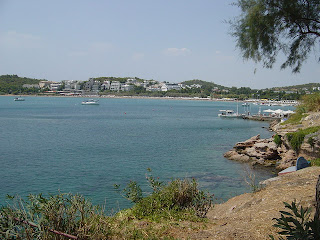Sailing: First time out alone
OK, so you walked in the boat for the first time, you managed to balance both when standing up when the boat is stopped and when sitting across the sail when you want to sail. What next?
It is always a good idea as a starter to avoid hitting other boats. Another good idea is to never hold the boom. And finally if sth goes wrong when going upwind remember, just let the sail go and keep the rudder straight. When going downwind, turn to upwind and stop (the sail is already all the way out).
Before leaving the dock it is always a good idea to check the direction of the wind, take a look towards the sea/river/lake and find out where are the puffs (these darker areas on the water where the water is rippling) are coming from and finally warm up. It is something that sailors rarely do. But they should. A little jumping and stretching (if not running on the beach) will get those legs warned up. After all, you are relying to them for hiking (when you put your legs under the hiking straps, extend your legs so that your butt and back are outside the boat).
Finally it is a good idea to know what happens if you are about to meet another boat. This is why we have rules: the
ISAF (International Sailing Federation) rules. As all rules, they are boring and mostly for racers, but it's good to know of their existence as it will make other boats not fear you!





